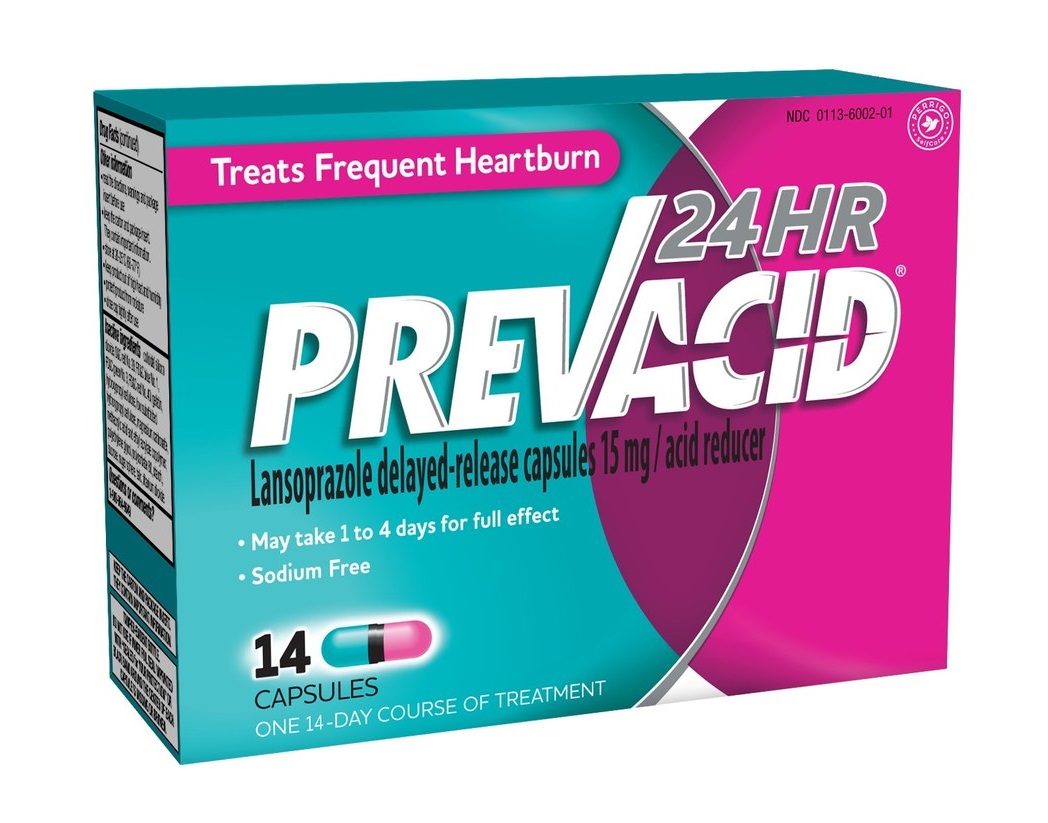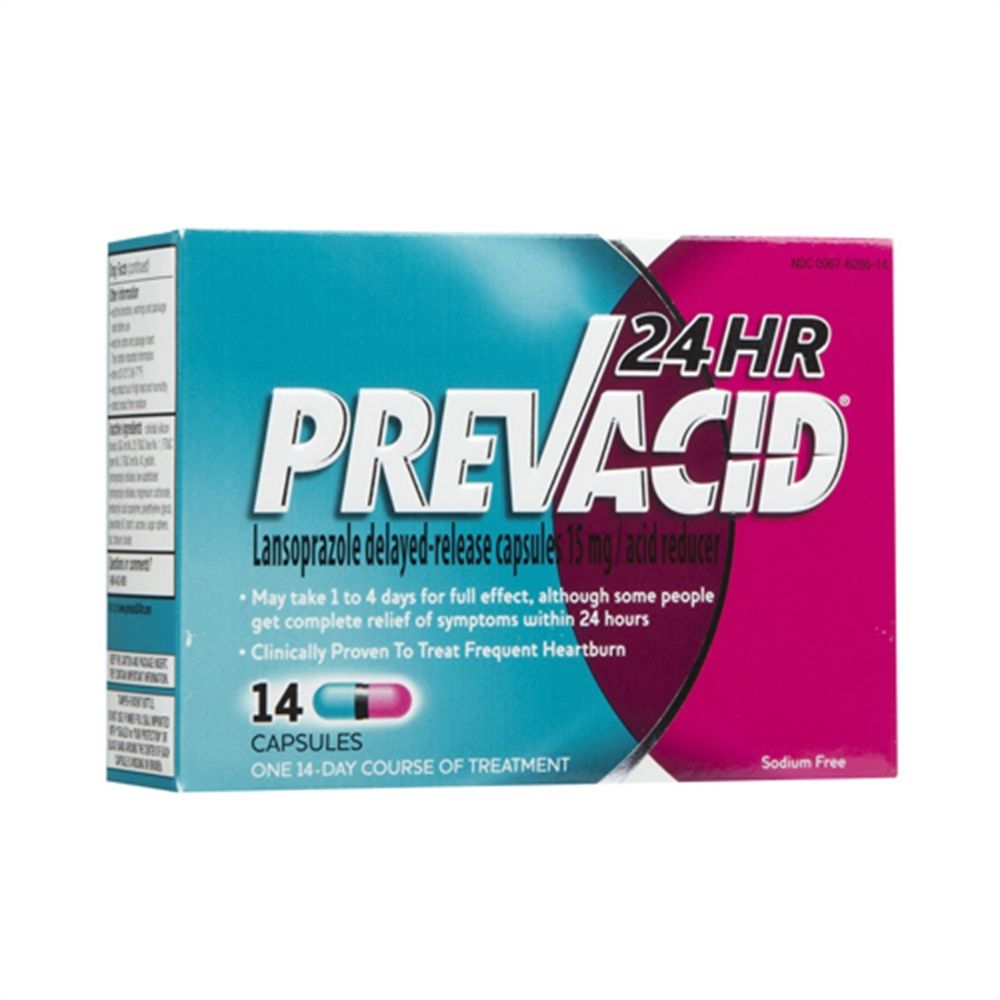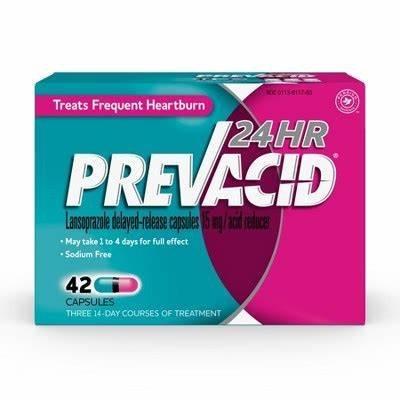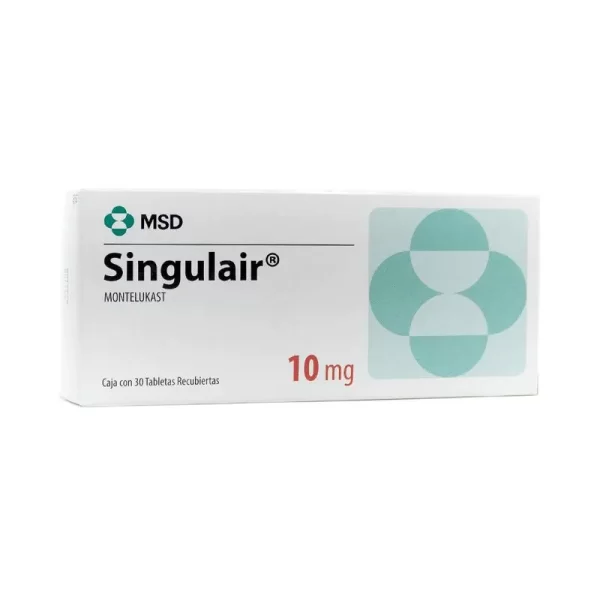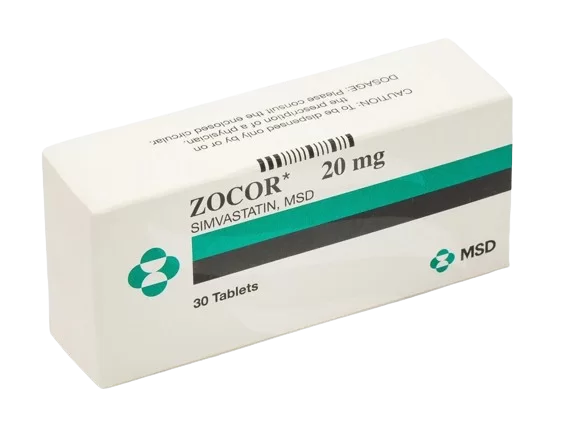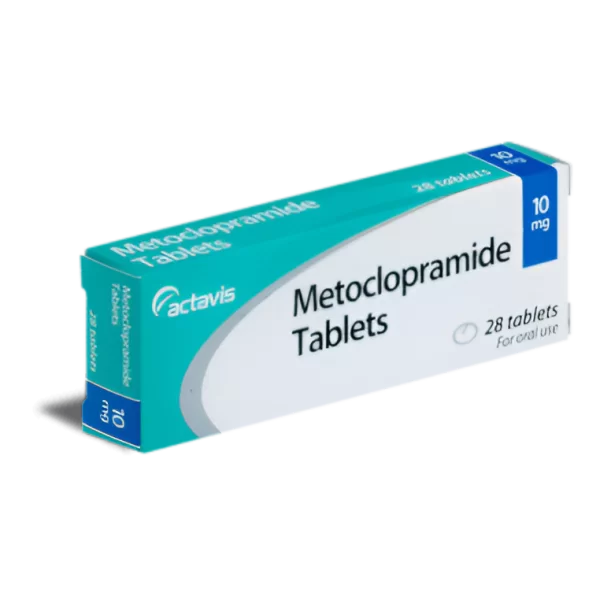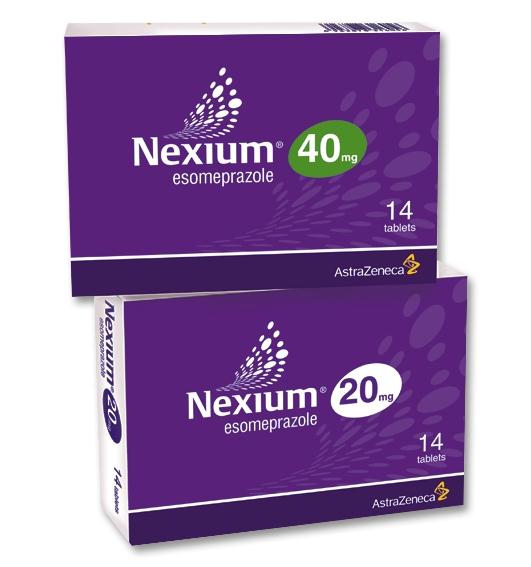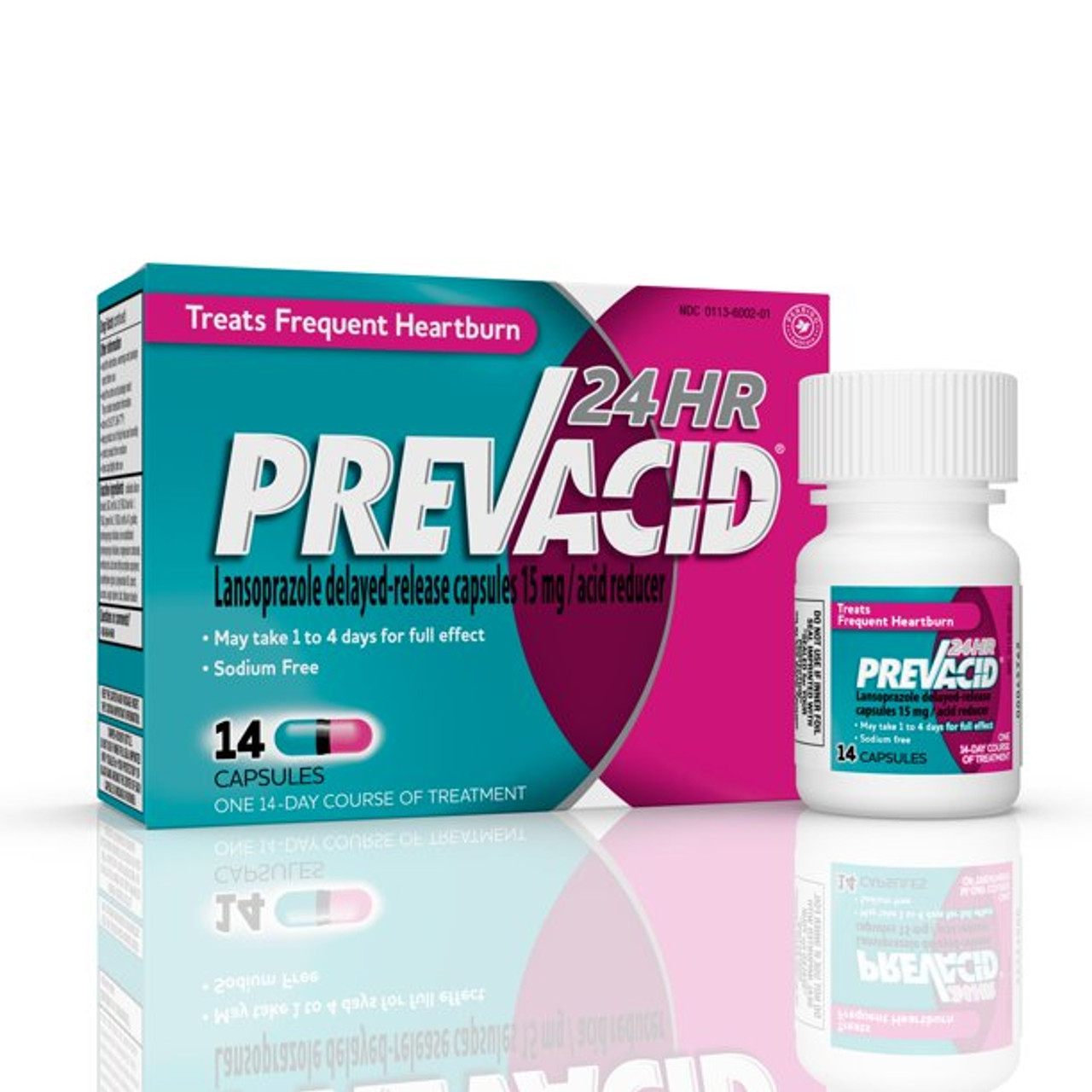
Prevacid
Prevacid - 30mg
| Product | Per Pill | Savings | Per Pack | Order |
|---|---|---|---|---|
| 60 pills | $0.82 | $49.38 | Buy Now | |
| 90 pills | $0.74 | $7.11 | $74.08 $66.97 | Buy Now |
| 120 pills | $0.70 | $14.22 | $98.77 $84.55 | Buy Now |
| 180 pills | $0.67 | $28.45 | $148.16 $119.71 | Buy Now |
| 270 pills | $0.64 | $49.78 | $222.23 $172.45 | Buy Now |
| 360 pills | $0.63 | $71.11 | $296.30 $225.19 | Buy Now |
Prevacid - 15mg
Overview of Prevacid
General Introduction
Prevacid, generically known as lansoprazole, is a widely used proton pump inhibitor (PPI) designed to reduce stomach acid production. It is commonly prescribed for the treatment of gastroesophageal reflux disease (GERD), peptic ulcers, and Zollinger-Ellison syndrome. By inhibiting the enzyme in the stomach lining responsible for acid production, Prevacid effectively alleviates symptoms and promotes the healing of the esophagus, stomach, and duodenum.
Primary Purpose of Prevacid
Main Purpose
The main purpose of Prevacid is to manage and treat conditions caused by excessive stomach acid. It is often prescribed for individuals suffering from GERD, where acid from the stomach flows back into the esophagus, causing heartburn and potential damage to the esophageal lining. Additionally, Prevacid treats peptic ulcers and manages Zollinger-Ellison syndrome, a rare condition characterized by tumors that increase acid production.
Key Aspects of Prevacid
Key Aspects
Prevacid stands out due to its high efficacy in reducing acid production, thereby providing significant relief from symptoms and preventing further complications. It is available in various forms, including delayed-release capsules, orally disintegrating tablets, and a liquid suspension, offering flexibility in administration to suit different patient needs.
Benefits and Useful Properties of Prevacid
Benefits
Prevacid's benefits include its effectiveness, safety, and dosing convenience. Clinical studies show significant improvement in patients within a few days of starting treatment. Prevacid is generally well-tolerated, with a low incidence of side effects. The medication's once-daily dosing schedule enhances patient compliance, making it easier to integrate into daily routines. Its various formulations cater to patients who have difficulty swallowing pills.
Indications for Use of Prevacid
Conditions Treated
Prevacid is indicated for the treatment of several acid-related conditions:
- GERD: Chronic condition where stomach acid frequently flows back into the esophagus, causing heartburn and irritation.
- Peptic Ulcers: Including gastric and duodenal ulcers, by reducing acid production and allowing the ulcers to heal.
- Zollinger-Ellison Syndrome: A rare disorder causing tumors in the pancreas and duodenum, leading to excessive acid production.
Symptoms Alleviated
Prevacid alleviates symptoms associated with excessive stomach acid:
- For GERD: Relieves persistent heartburn, regurgitation, and chest pain.
- For Peptic Ulcers: Reduces pain, nausea, and bleeding associated with the ulcers.
- For Zollinger-Ellison Syndrome: Controls hyperacidity symptoms, including severe and recurrent ulcers, diarrhea, and abdominal pain.
Target Audience
Prevacid is suitable for adults and children who suffer from acid-related disorders. It is particularly beneficial for individuals with chronic and severe symptoms that affect their quality of life. Pregnant or breastfeeding women should consult their healthcare provider before starting Prevacid to assess potential risks and benefits.
Dosage and Administration of Prevacid
Dosage and Frequency
The recommended dosage of Prevacid varies based on the condition being treated:
- For GERD and Peptic Ulcers: Typical dose is 15-30 mg once daily before a meal.
- For Zollinger-Ellison Syndrome: Starting dose may be 60 mg per day, with potential adjustments based on the patient's response.
Timing of Administration
Prevacid should be taken before meals, preferably in the morning, to maximize its effectiveness. For those on a once-daily regimen, taking the medication at the same time each day helps maintain consistent acid suppression and enhances treatment efficacy. Patients are advised not to crush or chew the capsules but to swallow them whole with a glass of water.
Additional Recommendations
For optimal results, patients should adhere to the prescribed regimen and avoid missing doses. If a dose is missed, it should be taken as soon as remembered, unless it is almost time for the next dose. In such cases, the missed dose should be skipped, and the regular schedule resumed. Patients should inform their healthcare provider of any other medications they are taking to avoid potential interactions.
Mechanism of Action of Prevacid
Action Mechanism
Prevacid, or lansoprazole, works by inhibiting the proton pump, an enzyme found in the stomach lining responsible for secreting hydrochloric acid. By blocking this enzyme, Prevacid effectively reduces the production of stomach acid, thereby alleviating symptoms and promoting the healing of acid-related conditions such as GERD, peptic ulcers, and Zollinger-Ellison syndrome.
Biochemical Processes
Lansoprazole, the active ingredient in Prevacid, binds to the proton pumps in the parietal cells of the stomach. This binding is irreversible, meaning the proton pumps are permanently deactivated until new ones are synthesized. This process significantly decreases acid production, leading to a higher pH in the stomach, which provides a more favorable environment for healing the esophagus, stomach, and duodenum.
Physiological Effects
By reducing stomach acid, Prevacid alleviates the symptoms associated with hyperacidity, such as heartburn, acid reflux, and indigestion. The medication also helps prevent further damage to the gastrointestinal tract, allowing ulcers to heal and reducing the risk of complications such as bleeding or perforation. For patients with Zollinger-Ellison syndrome, Prevacid helps manage symptoms by controlling excessive acid production, improving their quality of life.
Composition of Prevacid
Active Ingredients
Prevacid contains lansoprazole as its active ingredient. Lansoprazole is a proton pump inhibitor that effectively reduces stomach acid production. Each dose of Prevacid delivers a specific amount of lansoprazole, which is the key component responsible for the medication's therapeutic effects.
Inactive Ingredients
In addition to the active ingredient, Prevacid includes several inactive ingredients that aid in the formulation and stability of the medication. These may include substances like magnesium carbonate, mannitol, hydroxypropyl cellulose, and hypromellose. These components help maintain the integrity of the capsules or tablets, ensuring they dissolve properly in the stomach.
Formulations
Prevacid is available in various formulations to accommodate different patient needs. These include delayed-release capsules, orally disintegrating tablets, and a liquid suspension. The delayed-release capsules and tablets are designed to withstand stomach acid and release the active ingredient in the intestines, ensuring optimal absorption and efficacy.
Side Effects of Prevacid
Common Side Effects
While Prevacid is generally well-tolerated, some patients may experience mild side effects. Common side effects include headache, nausea, diarrhea, and abdominal pain. These side effects are usually temporary and diminish as the body adjusts to the medication. If they persist or worsen, patients should consult their healthcare provider.
Less Common Side Effects
Less common side effects of Prevacid may include dizziness, constipation, dry mouth, or rash. Although these side effects are rare, patients should be aware of them and seek medical advice if they occur. Monitoring for any unusual symptoms during treatment is important to ensure safe use of the medication.
Serious Side Effects
Serious side effects are rare but can occur. These may include severe allergic reactions, such as hives, difficulty breathing, or swelling of the face, lips, tongue, or throat. Other serious side effects can include severe stomach pain, persistent diarrhea, muscle cramps, or signs of low magnesium levels (such as irregular heartbeat, muscle weakness, or seizures). Patients experiencing any of these symptoms should seek immediate medical attention.
Prevention of Side Effects with Prevacid
Preventive Measures
To minimize the risk of side effects, patients should follow their healthcare provider's instructions regarding the use of Prevacid. Taking the medication exactly as prescribed, without skipping doses or exceeding the recommended amount, is crucial. Patients should inform their doctor about all medications they are taking, including over-the-counter drugs and supplements, to avoid potential interactions.
Dietary Considerations
Certain dietary habits can help reduce the risk of side effects. Patients should avoid foods and beverages that may irritate the stomach lining, such as spicy foods, alcohol, and caffeine. Drinking plenty of water and eating smaller, more frequent meals can also help minimize gastrointestinal discomfort.
Monitoring and Consultation
Regular monitoring by a healthcare provider is essential, especially during long-term use of Prevacid. Patients should report any unusual or persistent symptoms to their doctor promptly. Periodic blood tests may be recommended to check for potential nutrient deficiencies, such as vitamin B12 or magnesium, which can occur with prolonged use of proton pump inhibitors.
Contraindications of Prevacid
General Contraindications
Prevacid is contraindicated in patients with known hypersensitivity to lansoprazole or any of the inactive ingredients in the formulation. It should not be used in individuals who have experienced severe allergic reactions to other proton pump inhibitors.
Specific Conditions
Patients with severe liver disease should use Prevacid with caution, as liver function impairment can affect the metabolism of the medication. Additionally, Prevacid is not recommended for individuals with a history of osteoporosis-related fractures, as long-term use of PPIs may increase the risk of bone fractures.
Pregnancy and Lactation
Pregnant and breastfeeding women should only use Prevacid if the potential benefits outweigh the risks. While animal studies have not shown significant harm to the fetus, there are no well-controlled studies in pregnant women. Lansoprazole is excreted in human milk, and the effects on the nursing infant are unknown. A healthcare provider should evaluate the need for Prevacid in these situations.
Warnings and Precautions for Prevacid
Allergic Reactions
Patients with a history of hypersensitivity reactions to PPIs should avoid using Prevacid. Symptoms of a severe allergic reaction include rash, itching, swelling, severe dizziness, and trouble breathing. Immediate medical attention is necessary if these symptoms occur.
Bone Fractures
Long-term use of Prevacid, especially at high doses, may increase the risk of osteoporosis-related fractures of the hip, wrist, or spine. Patients at risk for osteoporosis should manage their bone health through adequate calcium and vitamin D intake, regular exercise, and periodic bone density assessments.
Vitamin B12 Deficiency
Chronic use of Prevacid can lead to vitamin B12 deficiency, particularly in elderly patients or those on the medication for more than three years. Symptoms of deficiency include weakness, tiredness, and neurological changes such as numbness or tingling. Regular monitoring of vitamin B12 levels is recommended for long-term users.
Missed Dose of Prevacid
What to Do
If a patient misses a dose of Prevacid, it should be taken as soon as they remember. However, if it is near the time for the next dose, the missed dose should be skipped. Doubling up on doses to make up for a missed one is not advisable, as it can increase the risk of side effects.
Tips for Consistent Dosing
Patients can use reminders to help take Prevacid consistently. Setting an alarm or using a medication reminder app can be effective. Keeping the medication in a visible place, such as next to a toothbrush or coffee maker, can also serve as a visual reminder.
When to Seek Help
If a patient frequently forgets to take their medication or is unsure about what to do after missing a dose, they should consult their healthcare provider. The provider can offer strategies for better adherence or adjust the treatment plan if necessary.
Drug Interactions with Prevacid
Importance of Awareness
Understanding drug interactions is crucial for the safe use of Prevacid. Certain medications can affect how Prevacid works, and vice versa. Patients should inform their healthcare provider about all the medications they are taking, including prescription drugs, over-the-counter medications, vitamins, and herbal supplements.
Common Interactions
- Antiretrovirals: Prevacid can reduce the effectiveness of certain antiretroviral drugs used to treat HIV.
- Anticoagulants: Concurrent use with warfarin may increase the risk of bleeding; regular monitoring of blood coagulation levels is advised.
- Methotrexate: High doses of methotrexate can lead to increased toxicity when used with Prevacid.
Recommendations
Patients should avoid using Prevacid with medications that require an acidic stomach environment for proper absorption, such as ketoconazole. They should also consult their healthcare provider before starting or stopping any medication to avoid adverse interactions.
Overdose of Prevacid
Symptoms of Overdose
Symptoms of a Prevacid overdose may include confusion, drowsiness, blurred vision, fast or irregular heartbeat, nausea, and vomiting. In severe cases, it can lead to more serious complications such as seizures or coma.
Immediate Actions
In case of suspected overdose, it is crucial to seek immediate medical attention. Patients should not attempt to induce vomiting unless directed by medical personnel. Contacting a poison control center can provide immediate guidance on the necessary steps to take.
Prevention Tips
To prevent overdose, patients should adhere strictly to the prescribed dosage and administration guidelines. Keeping medication out of reach of children and storing it in a secure location can help avoid accidental ingestion. Regularly reviewing the dosage with a healthcare provider can ensure it remains appropriate for the patient’s condition.
Pharmacokinetics of Prevacid
Absorption
Prevacid is rapidly absorbed after oral administration, with peak plasma concentrations occurring within 1.7 hours. The bioavailability of lansoprazole increases with repeated dosing, and it is best absorbed when taken before meals.
Distribution
Lansoprazole is extensively bound to plasma proteins, primarily albumin, with a protein-binding rate of approximately 97%. It distributes widely throughout the body, reaching therapeutic levels in the stomach lining to exert its effect.
Metabolism
Lansoprazole is extensively metabolized in the liver by the cytochrome P450 enzyme system, particularly CYP2C19 and CYP3A4. The metabolites have minimal pharmacological activity, and the metabolism can vary among individuals due to genetic polymorphisms.
Excretion
The metabolites of lansoprazole are primarily excreted through the urine (80%) and feces (20%). The half-life of lansoprazole ranges from 1 to 2 hours, but its effect on acid secretion lasts longer due to the irreversible binding to proton pumps.
Dosage Forms of Prevacid
Available Forms
Prevacid is available in several formulations to suit patient preferences and needs. These include delayed-release capsules, orally disintegrating tablets (SoluTab), and a liquid suspension. Each form is designed to provide effective acid suppression while accommodating different modes of administration.
Dosing Options
- Delayed-Release Capsules: Typically available in 15 mg and 30 mg strengths.
- Orally Disintegrating Tablets: Available in 15 mg and 30 mg strengths, providing an option for those who have difficulty swallowing capsules.
- Liquid Suspension: Useful for patients who prefer a liquid form or have swallowing difficulties.
Advantages
Each dosage form offers specific benefits. The capsules provide a consistent release of the medication, while the orally disintegrating tablets dissolve quickly in the mouth, making them convenient for patients with swallowing issues. The liquid suspension ensures precise dosing and is easy to ingest.
Pregnancy and Breastfeeding with Prevacid
Safety During Pregnancy
The safety of Prevacid during pregnancy has not been fully established. Animal studies have not shown significant harm, but there are no well-controlled studies in pregnant women. Prevacid should only be used during pregnancy if the potential benefits outweigh the risks. Pregnant women should consult their healthcare provider before using Prevacid.
Use During Breastfeeding
Lansoprazole is excreted in human milk, and the effects on nursing infants are unknown. Breastfeeding mothers should discuss the potential risks and benefits with their healthcare provider. In some cases, an alternative treatment may be recommended, or breastfeeding may need to be discontinued while using Prevacid.
Recommendations
For pregnant or breastfeeding women, it is crucial to seek medical advice before starting Prevacid. Healthcare providers will consider the individual circumstances and potential risks to determine the best course of action. Close monitoring may be necessary if Prevacid is used during these periods.
Storage Conditions for Prevacid
Storage Recommendations
Prevacid should be stored at room temperature, between 15°C to 25°C (59°F to 77°F), in a dry place away from direct sunlight and moisture. The medication should remain in its original packaging to protect it from light and humidity.
Handling Precautions
It is important to keep Prevacid out of reach of children and pets to prevent accidental ingestion. Do not store the medication in damp places like bathrooms, as moisture can affect its stability and efficacy. Ensure the bottle or blister pack is tightly closed when not in use.
Shelf Life
Check the expiration date on the packaging and do not use Prevacid past this date. Expired medication should be disposed of properly, following local regulations or guidelines provided by a pharmacist. Do not flush the medication down the toilet or pour it into a drain.
Clinical Trials and Efficacy of Prevacid
Clinical Research
Prevacid has undergone extensive clinical trials to evaluate its efficacy and safety. Studies have demonstrated its effectiveness in treating GERD, peptic ulcers, and Zollinger-Ellison syndrome. These trials involved large patient populations and various dosages to establish the optimal use of the medication.
Key Findings
In GERD patients, clinical trials showed that Prevacid significantly reduced heartburn symptoms and healed esophageal erosions in up to 90% of patients within eight weeks. For peptic ulcer treatment, Prevacid promoted healing in a high percentage of patients, often within four weeks. Studies also confirmed its efficacy in managing Zollinger-Ellison syndrome by controlling excessive acid production and alleviating related symptoms.
Efficacy Summary
The clinical trials confirm that Prevacid is a reliable and effective treatment for acid-related disorders. Its ability to reduce stomach acid production and promote healing makes it a preferred choice for many healthcare providers. Patients can expect significant symptom relief and improved quality of life with appropriate use of Prevacid.
Conclusion on Prevacid
Summary
Prevacid (lansoprazole) is a highly effective proton pump inhibitor used to treat various acid-related conditions such as GERD, peptic ulcers, and Zollinger-Ellison syndrome. It works by reducing stomach acid production, providing relief from symptoms and promoting healing. Prevacid is available in different formulations, making it suitable for a wide range of patients.
Key Advantages
- Effectiveness: Proven to significantly reduce symptoms and promote healing in acid-related conditions.
- Safety: Generally well-tolerated with a low incidence of side effects.
- Convenience: Available in multiple formulations to suit different patient needs, with a once-daily dosing schedule enhancing compliance.
Recommendations
Patients should follow their healthcare provider's instructions for optimal results. It is important to take Prevacid as prescribed, maintain regular follow-ups, and report any unusual symptoms promptly. Prevacid's benefits in managing acid-related disorders make it a valuable medication for improving patients' quality of life.
